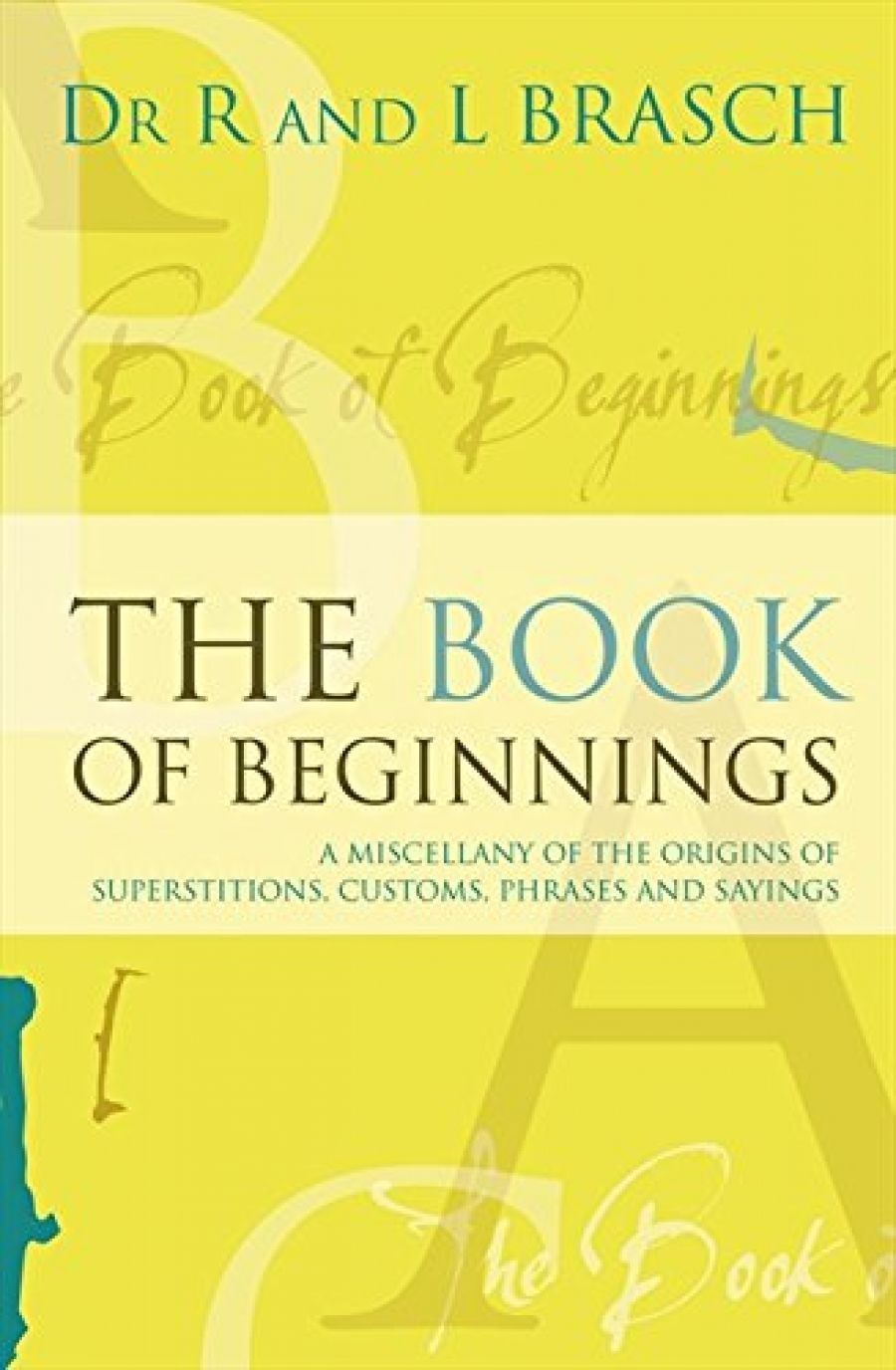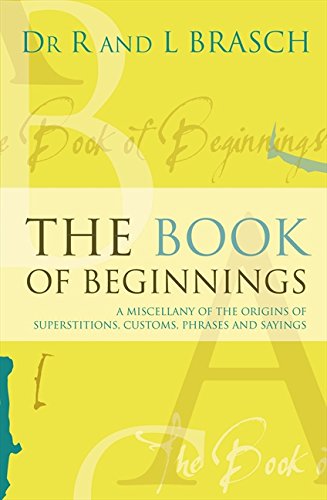
- Free Article: No
- Contents Category: Non-fiction
- Review Article: Yes
- Article Title: Fair dinkum local Brewer
- Online Only: No
- Custom Highlight Text:
Dr Rudolph (Rudy) Brasch’s career as a rabbi took him from Germany to London and, finally, in 1949, to the Temple Emmanuel in Sydney, where he remained for thirty years. His learning was wide and eclectic, and this is reflected in The Book of Beginnings, which he compiled with the assistance of his wife, Li Brasch. Dr Brasch died in November 2004, at the age of ninety-two.
- Book 1 Title: The Book of Beginnings
- Book 1 Subtitle: A miscellany of the origins of superstitions, customs, phrases and sayings
- Book 1 Biblio: ABC Books, $89.95 hb, 1167 pp
- Book 1 Cover Small (400 x 600):

- Book 1 Cover (800 x 1200):

There are some 4000 entries in an A to Z structure. For a similar book, the obvious comparison is Brewer’s Dictionary of Phrase and Fable, although there are also significant differences of emphasis and detail. Thus, while Brewer is not greatly interested in sports, the Brasch book has long entries (often three to four pages) on most major sports. There are detailed entries on topics as diverse as the Shield of David and the Rolls Royce Radiator and its mascot. Customs such as the bride wearing ‘something old, something new, something borrowed, something blue’, proverbs such as ‘the straw that broke the camel’s back’, and superstitions such as meeting a black cat are explained in detail and in very clear prose. Unusual but fascinating entries include the fourteen pages on the meanings of symbols on gravestones, and three pages on the origin of inn names and tavern signs. Many British inns are called ‘The Pig and Whistle’, both words being corruptions of earlier terms – the ‘pig’ is really piggen (the ‘pail’ or ‘mug’ from which ale was drunk), and the ‘whistle’ is really wes hale (our ‘wassail’), meaning ‘be hale’, ‘be of good health’. So the name is really saying ‘come in and have a drink for your health’!
The range of material is extraordinary. ‘Adam’s apple’ seems to be a straightforward allusion to the piece of apple that was supposedly permanently stuck in Adam’s throat as a reminder of the Fall. This bulge in the throat was originally called pomum viri (‘man’s rounded lump’, although pomum could also be used for a specific rounded lump, the ‘apple’), but in Hebrew and Arabic the word for ‘man’ was adam, so some early doctors referred to it as pomum adami, making the corruption into ‘Adam’s apple’ almost inevitable. Similarly, the tomato came to be called a ‘love apple’ because, after the Italians called it pomo dei Moro (‘the apple of the Moors’), the French subsequently incorrectly rendered this as pomme d’amour. ‘As sure as eggs is eggs’, we learn, was originally ‘as sure as X is X’. The saying ‘always a bridesmaid but never a bride’ had its origin in a 1920s advertisement for Listerine. Parking meters were invented and first installed in Oklahoma City in 1935. In 1697 the French writer Charles Perrault turned Cinderella’s fur slipper into the unlikely glass slipper by substituting verre (‘glass’) for vair (‘fur’).
Many curious questions are answered. Why is green used for ‘go’ in traffic lights (the colour was originally white)? Why are tennis players ‘seeded’? Why are surgeons addressed as ‘Mr’ instead of ‘Dr’? Why is the pronoun ‘I’ capitalised? Why do athletes race in an anticlockwise direction? And why do the English, when making tea, pour the milk into the cup before the tea?
With the material covering such wide areas, it is difficult for the lay reader to judge just how accurate it all is. Take, for example, ‘posh’. This book trots out the story that it is an acronym from ‘Port-Outward-Starboard-Homeward’, going back to the days of P&O liners on the Britain-to-India run when wealthy passengers reserved for themselves the side out of the burning sun. But all recent dictionaries point out that there is no evidence for this origin, and that it is a typical piece of folk etymology. Similarly, in the discussion of ‘window’, the etymology is given as ‘a combination of Anglo-Saxon words’ that mean ‘wind’s eye’. This completely misses the fascinating historical fact that the Anglo-Saxon word for window was eye-thirel, literally ‘eye-hole’ (‘thirel’ develops into ‘thrill’), a hole in the wall that you could look through. The Viking word was wind-auga (‘wind’s eye’), and the Viking word replaced the Anglo-Saxon word.
There is a good emphasis on Australian material, but I noticed here some surprising claims and gaps. I know of no evidence that would support the possibility that ‘fair dinkum’ could be a corruption of ‘fair drinking’, as uttered on the goldfields. The argument that the Australian sense of ‘barrack’ derives from the playing of football near soldiers’ barracks is unlikely given the similar sense of ‘barrack’ in Irish English. The Māori raho is put forward (without saying what it means in Māori) as a possible origin for ‘brass razoo’, but even the Dictionary of New Zealand English (1997) says that any connection with Māori raho ‘testicle’ is ‘most unlikely’. The notion that ‘Old Dart’ (meaning ‘the British Isles’) is an allusion to Dartmoor Prison is just as unlikely, and the suggestion that it might derive from the broad arrow (or ‘dart’) on British government property is about as silly as it gets – and there is no mention of the likely origin in a dialectal pronunciation of ‘dirt’. The claim that ‘budgerigar’ is a combination of ‘the Aborigines’ words for ‘good’ – budgeree – and ‘cockatoo’ – gar’ – is just not sustainable. Budgeree is certainly from the Dharuk of the Sydney region, but ‘budgerigar’ is from further inland New South Wales, probably from Kamilaroi gijirrigaa.
These worries notwithstanding, there is much in this book to educate, entertain and delight. If you have a Brewer on your shelves, you will want a Brasch.


Comments powered by CComment